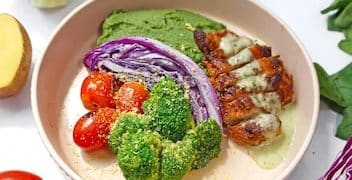Gut Health: Top 5 Probiotic-Rich Foods for Your Daily Diet

The ultimate guide to gut health highlights five probiotic-rich foods—yogurt, kefir, sauerkraut, kimchi, and kombucha—that can be seamlessly integrated into your daily diet to enhance digestive health, boost immunity, and improve overall well-being.
Unlock the secrets to a healthier gut with our ultimate guide! Discover how incorporating just five delicious, probiotic-rich foods into your daily routine can revolutionize your digestive health and overall well-being.
Understanding Gut Health and the Importance of Probiotics
Gut health has become a buzzword these days, but what does it really mean, and why should you care? Your gut, or the gastrointestinal tract, is home to trillions of bacteria, both good and bad. Maintaining a healthy balance of these bacteria is crucial for various bodily functions.
Probiotics, often referred to as “good” bacteria, play a vital role in keeping your gut balanced and functioning optimally. They aid in digestion, boost your immune system, and can even improve your mental health. Incorporating probiotic-rich foods into your diet is a simple yet effective way to support your gut health.
The Gut-Brain Connection
One of the most fascinating aspects of gut health is its connection to the brain. The gut-brain axis is a communication network that links your gut and brain. An unhealthy gut can negatively impact your mood, cognitive function, and even contribute to mental health disorders like anxiety and depression.
By nourishing your gut with probiotic-rich foods, you can positively influence your brain health, leading to improved mood, reduced stress, and enhanced cognitive abilities.
The Role of Probiotics in Immunity
Did you know that a significant portion of your immune system resides in your gut? Probiotics help strengthen your immune system by competing with harmful bacteria, producing antimicrobial substances, and stimulating immune cells. A healthy gut can better defend against infections and illnesses.
- Boosts Immune Response: Probiotics enhance the activity of immune cells, making them more effective at fighting off pathogens.
- Reduces Inflammation: Probiotics can help reduce inflammation in the gut, preventing chronic diseases.
- Enhances Nutrient Absorption: A healthy gut absorbs nutrients more efficiently, ensuring your body gets the vitamins and minerals it needs to function properly.

In conclusion, understanding the importance of gut health and the role of probiotics is the first step towards improving your overall well-being. By incorporating probiotic-rich foods into your diet, you can positively impact your digestion, immunity, and even your mental health.
Yogurt: A Creamy Probiotic Powerhouse
Yogurt is a widely popular and easily accessible probiotic-rich food. It’s made by fermenting milk with specific bacteria, such as Streptococcus thermophilus and Lactobacillus bulgaricus. These bacteria convert lactose into lactic acid, giving yogurt its characteristic tangy flavor and thick texture.
Not all yogurts are created equal, however. To reap the full probiotic benefits, it’s essential to choose yogurts that contain live and active cultures. Check the label for this information, and opt for plain, unsweetened varieties to avoid added sugars and artificial ingredients.
Health Benefits of Yogurt
Yogurt offers a wide range of health benefits beyond just probiotics. It’s an excellent source of protein, calcium, and essential vitamins and minerals. The probiotics in yogurt can improve digestion, boost immunity, and even aid in weight management.
Studies have shown that regular consumption of yogurt can reduce the risk of certain digestive disorders, such as irritable bowel syndrome (IBS) and inflammatory bowel disease (IBD).
How to Incorporate Yogurt into Your Diet
Yogurt is incredibly versatile and can be enjoyed in numerous ways. Here are a few ideas to get you started:
- Breakfast: Enjoy a bowl of yogurt with granola, fruits, and nuts for a nutritious and filling breakfast.
- Snack: Yogurt makes a healthy and satisfying snack on its own or paired with a handful of berries.
- Smoothies: Add yogurt to your smoothies for a creamy texture and probiotic boost.
- Cooking: Use yogurt as a substitute for sour cream or mayonnaise in salads, dips, and sauces.
In summary, yogurt is a creamy and delicious way to boost your probiotic intake and support your gut health. Choose yogurts with live and active cultures, opt for plain varieties, and get creative with how you incorporate it into your daily diet.
Kefir: The Drinkable Probiotic Champion
Kefir is a fermented milk drink that is similar to yogurt but has a thinner consistency and a slightly more sour taste. It’s made by adding kefir grains, which are a combination of bacteria and yeasts, to milk. These grains ferment the milk, producing a probiotic-rich beverage that is packed with nutrients.
Unlike yogurt, which typically contains a few strains of bacteria, kefir can contain dozens of beneficial bacteria and yeasts. This makes it a potent probiotic source with a wide range of health benefits.
Health Benefits of Kefir
Kefir is known for its impressive health benefits, including improved digestion, enhanced immunity, and even potential anti-cancer properties. The probiotics in kefir can help restore balance to your gut microbiome, reducing inflammation and promoting overall health.
Studies have shown that kefir can improve lactose digestion, making it a suitable option for individuals with lactose intolerance. It can also help lower cholesterol levels and improve bone density.
How to Incorporate Kefir into Your Diet
Kefir can be enjoyed on its own or added to smoothies and other beverages. Here are some creative ways to include kefir in your daily routine:
- Plain: Drink a glass of kefir on its own as a refreshing and probiotic-rich beverage.
- Smoothies: Add kefir to your smoothies for a creamy texture and probiotic boost.
- Breakfast: Pour kefir over your cereal or granola for a healthy and nutritious breakfast.
- Marinades: Use kefir as a marinade for meat and poultry to tenderize and add flavor.
In conclusion, kefir is a drinkable probiotic champion that offers a wide range of health benefits. With its diverse range of beneficial bacteria and yeasts, kefir is a potent probiotic source that can support your gut health and overall well-being.
Sauerkraut: Fermented Cabbage Goodness
Sauerkraut is a traditional fermented cabbage dish that has been enjoyed for centuries. It’s made by fermenting shredded cabbage with lactic acid bacteria, which produce a tangy and slightly sour flavor. Sauerkraut is a rich source of probiotics, as well as vitamins and minerals.
The fermentation process not only enhances the flavor of cabbage but also increases its nutritional value. Sauerkraut is packed with vitamin C, vitamin K, and various antioxidants.
Health Benefits of Sauerkraut
Sauerkraut offers numerous health benefits, including improved digestion, enhanced immunity, and potential anti-inflammatory properties. The probiotics in sauerkraut can help restore balance to your gut microbiome, promoting optimal digestion and nutrient absorption.
Studies have shown that sauerkraut can help reduce the risk of certain cancers, such as colon cancer and breast cancer. It can also help lower blood pressure and improve heart health.
How to Incorporate Sauerkraut into Your Diet
Sauerkraut can be enjoyed on its own or added to various dishes. Here are some delicious ways to include sauerkraut in your daily meals:
- Toppings: Top your hot dogs, sausages, and sandwiches with sauerkraut for a tangy and flavorful twist.
- Salads: Add sauerkraut to your salads for a probiotic boost and a crunchy texture.
- Side Dish: Serve sauerkraut as a side dish with grilled meats or vegetables.
- Soups: Add sauerkraut to your soups and stews for added flavor and nutrition.

In summary, sauerkraut is a fermented cabbage dish that is packed with probiotics and nutrients. With its tangy flavor and impressive health benefits, sauerkraut is a delicious and easy way to support your gut health.
Kimchi: A Spicy Korean Probiotic Delight
Kimchi is a traditional Korean fermented dish made primarily from napa cabbage and Korean radish, seasoned with a variety of spices, including chili powder, garlic, ginger, and scallions. The fermentation process, carried out by lactic acid bacteria, results in a spicy, tangy, and probiotic-rich food.
Kimchi is not only a staple in Korean cuisine but also a global health food, recognized for its beneficial effects on gut health, immunity, and overall well-being.
Health Benefits of Kimchi
Kimchi is loaded with probiotics, vitamins, and antioxidants, offering a wide array of health benefits. The probiotics in kimchi support a healthy gut microbiome, which can improve digestion and nutrient absorption. Additionally, kimchi is a good source of vitamins A, B, and C, as well as minerals like calcium and iron.
Regular consumption of kimchi has been linked to a stronger immune system, reduced inflammation, and a lower risk of certain chronic diseases. Some studies also suggest that kimchi may aid in weight management and improve heart health.
How to Incorporate Kimchi into Your Diet
Kimchi can be enjoyed in various ways, from eating it as a side dish to incorporating it into main meals. Here are some ideas to get you started:
- Side Dish: Serve kimchi as a traditional side dish with rice, meat, or vegetables.
- Kimchi Fried Rice: Add kimchi to your fried rice for a spicy and flavorful kick.
- Kimchi Stew: Use kimchi as a base for a hearty and warming stew.
- Topping: Top your tacos, burgers, or sandwiches with kimchi for an extra layer of flavor and probiotics.
In conclusion, kimchi is a spicy and flavorful fermented dish that is packed with probiotics and nutrients. Incorporating kimchi into your diet is a delicious way to support your gut health and enjoy the many benefits it has to offer.
Kombucha: The Fizzy Fermented Tea
Kombucha is a fermented tea beverage that has gained immense popularity in recent years. It’s made by fermenting sweetened tea with a SCOBY (symbiotic culture of bacteria and yeast). This fermentation process produces a tangy, slightly sweet, and effervescent drink that is rich in probiotics and antioxidants.
Kombucha comes in a variety of flavors, from fruity to herbal, making it a refreshing and healthy alternative to sugary sodas and juices.
Health Benefits of Kombucha
Kombucha offers a variety of health benefits, including improved digestion, enhanced immunity, and potential antioxidant effects. The probiotics in kombucha can help restore balance to your gut microbiome, promoting optimal digestion and nutrient absorption.
Studies have shown that kombucha can help lower blood sugar levels, improve cholesterol levels, and protect against liver damage. It may also have anti-cancer properties.
How to Incorporate Kombucha into Your Diet
Kombucha can be enjoyed on its own or mixed with other beverages. Here are some creative ways to include kombucha in your daily routine:
- Straight Up: Drink kombucha on its own as a refreshing and probiotic-rich beverage.
- Mixers: Use kombucha as a mixer in cocktails and mocktails for a tangy and fizzy twist.
- Smoothies: Add kombucha to your smoothies for a probiotic boost and a unique flavor.
- Vinegar Substitute: Use kombucha vinegar in salad dressings and marinades.
In conclusion, kombucha is a fizzy fermented tea that is packed with probiotics and antioxidants. With its refreshing taste and impressive health benefits, kombucha is a delicious and easy way to support your gut health.
| Key Point | Brief Description |
|---|---|
| 💪 Probiotics | Good bacteria for gut health, boosting immunity & digestion. |
| 🥛 Yogurt & Kefir | Dairy sources rich in probiotics, calcium, and protein. |
| 🥬 Sauerkraut & Kimchi | Fermented cabbage dishes with vitamins, minerals, and probiotics. |
| 🍵 Kombucha | Fermented tea beverage with probiotics and antioxidants. |
Frequently Asked Questions About Gut Health
▼
The gut microbiome refers to the trillions of bacteria, fungi, viruses, and other microorganisms living in your digestive tract. It plays a crucial role in digestion, immunity, and overall health.
▼
Probiotics introduce beneficial bacteria into your gut, helping to balance the microbiome. They aid in digestion, boost the immune system, and reduce inflammation.
▼
Yes, incorporating probiotic-rich foods like yogurt, kefir, sauerkraut, kimchi, and kombucha into your daily diet can provide a significant boost to your gut health.
▼
Some people may experience mild digestive symptoms like bloating or gas when first introducing probiotic-rich foods. Starting with small servings can help minimize these effects.
▼
Aim to include at least one serving of probiotic-rich foods in your daily diet. Consistency is key to maintaining a healthy gut microbiome over time.
Conclusion
Incorporating probiotic-rich foods into your daily diet is a simple and effective way to support your gut health and overall well-being. From creamy yogurt and kefir to tangy sauerkraut and kimchi, and fizzy kombucha, there are plenty of delicious options to choose from. So, start exploring these foods and discover the many benefits they have to offer!





